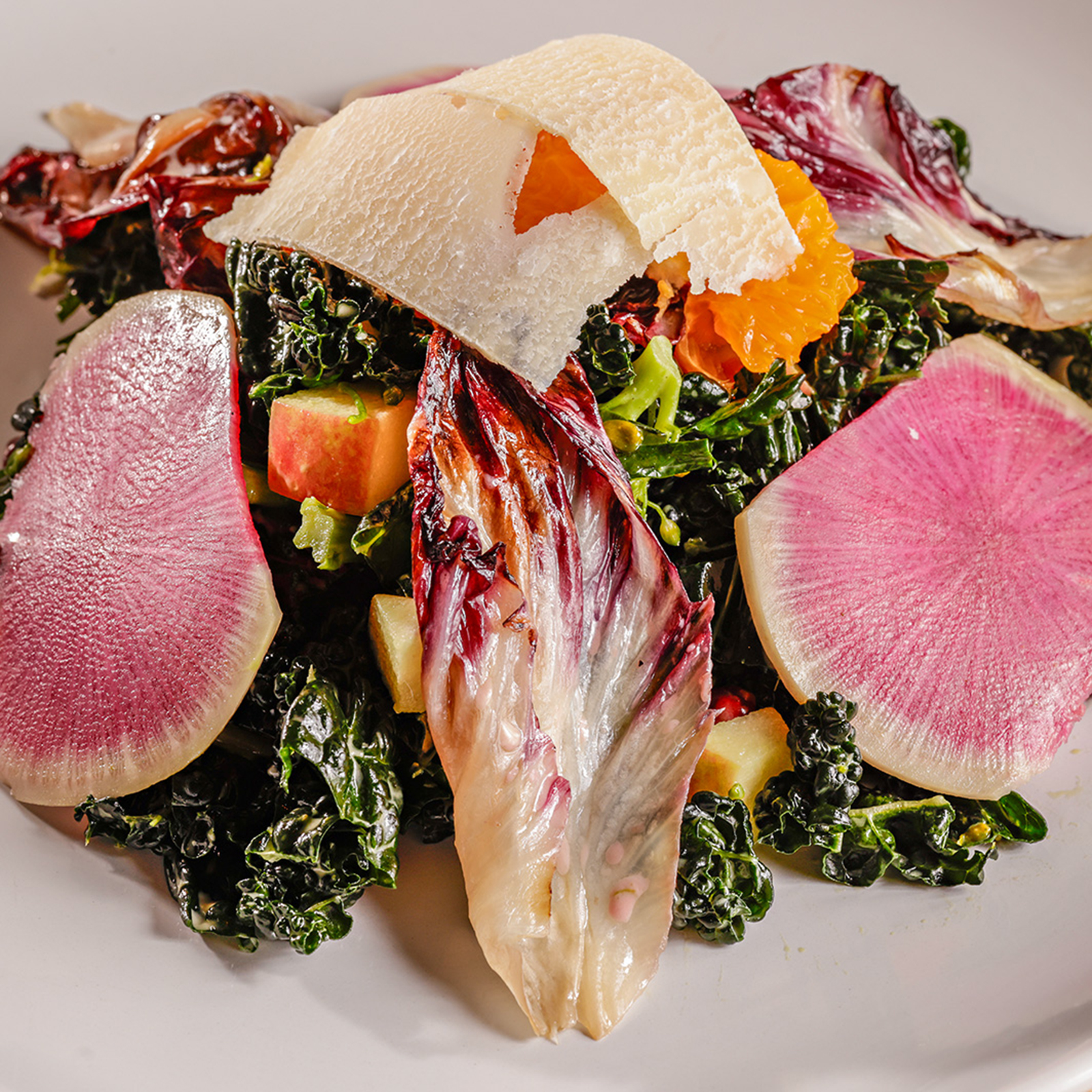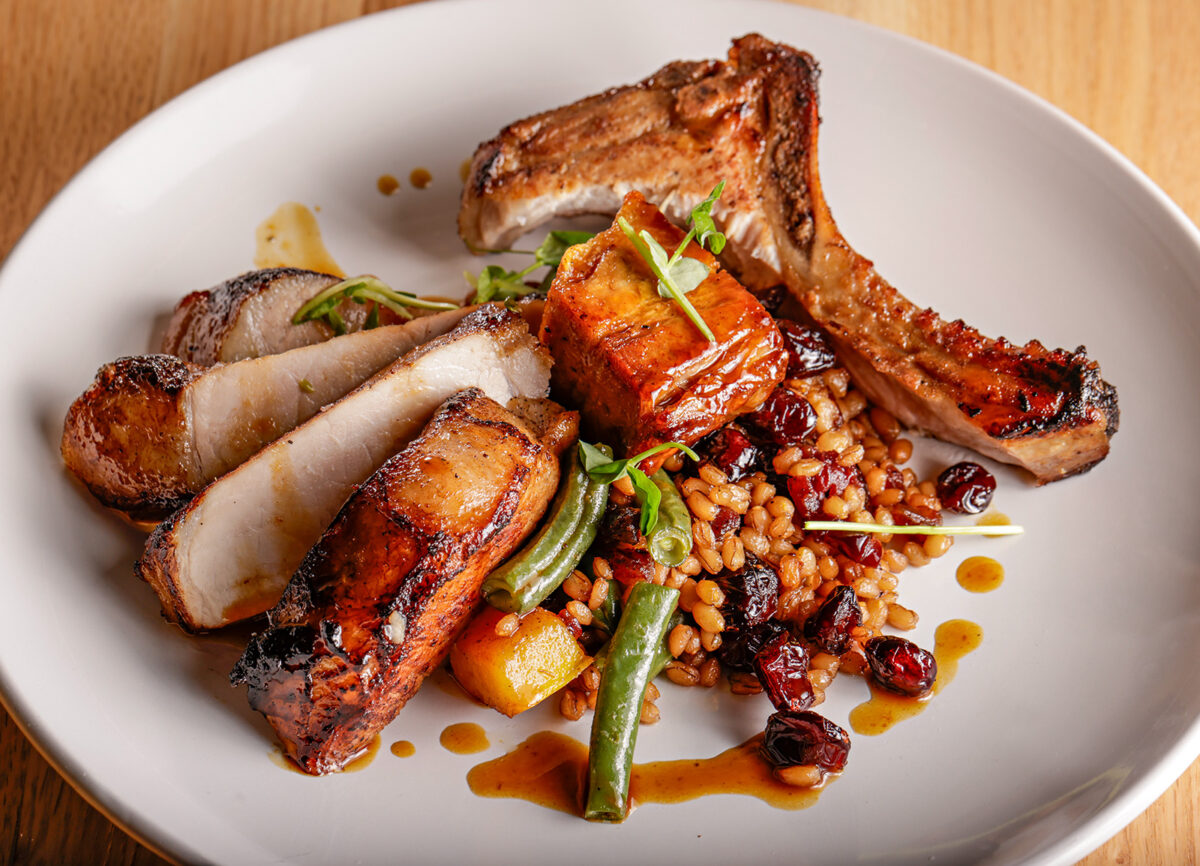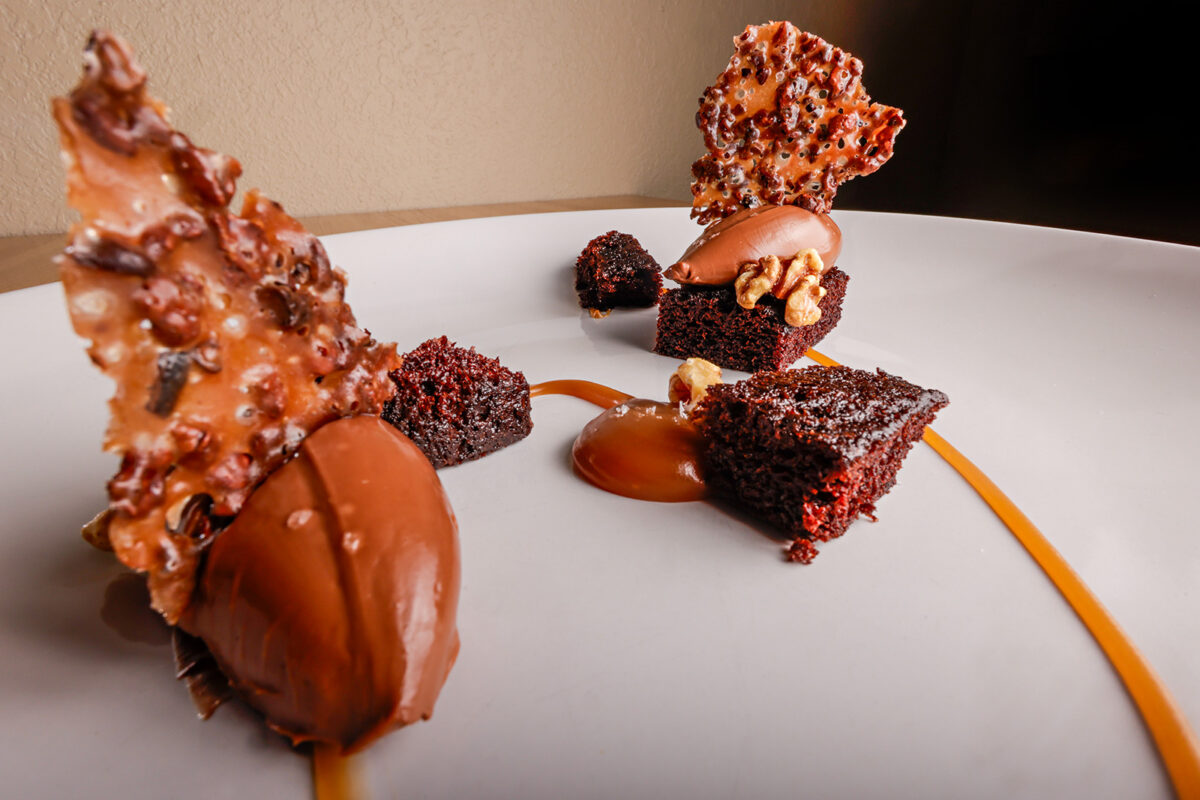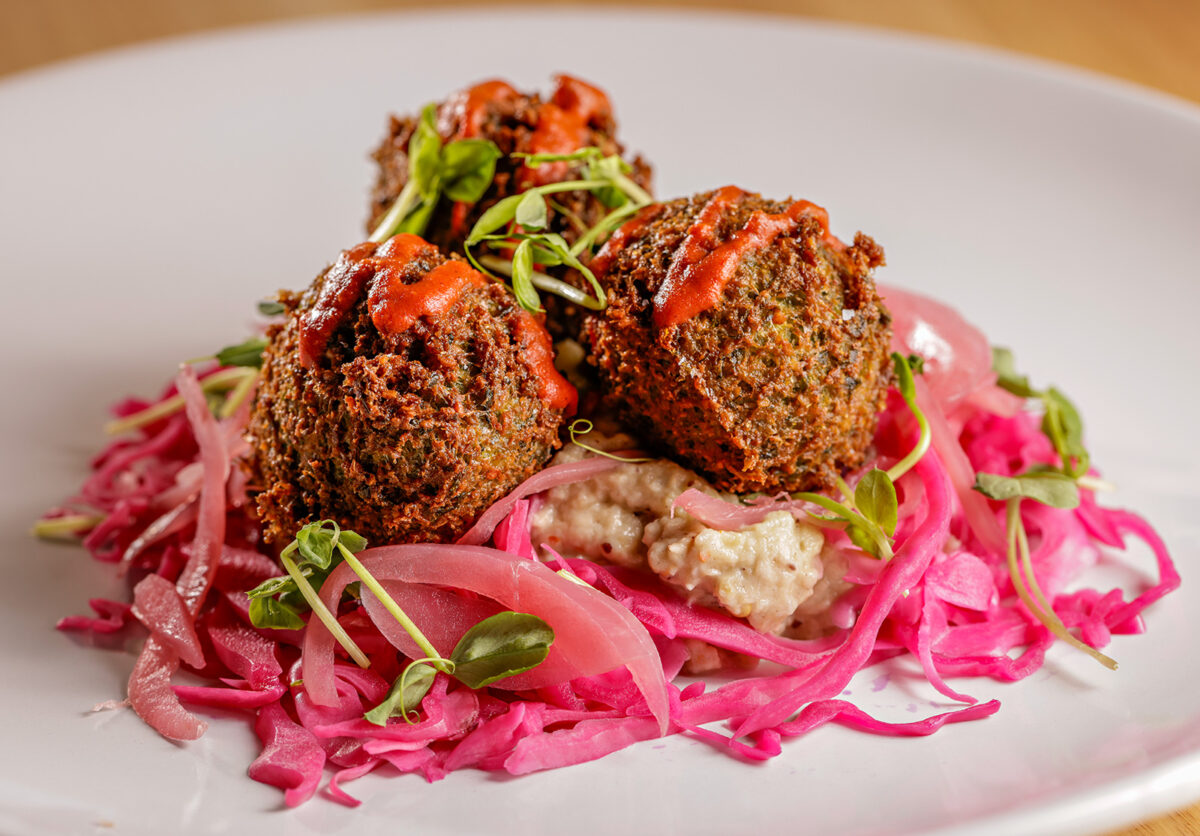
Adam Becker doesn’t subscribe to the idea that food on a plate shouldn’t touch, or mingle, or be mixed together and scooped up in forkfuls that can amount to small celebrations of flavor and texture.
That basic belief about food, something of a culinary version of the whole being greater than the sum of its parts, takes on an elevated significance when Becker — a local chef with Philadelphia roots and a deep well of experience in high-end restaurants, chocolatiers and patisseries — begins to deconstruct and describe what he’s trying to achieve with his new Whitefish restaurant Beldi, and how his career brought him to the Flathead.
Becker said the restaurant, located on Second Street, takes its name from an Arabic word used in the North African country of Morocco, which means something that is handcrafted or made in a traditional way. Explaining further, he said the meaning of “beldi” also implies something possessing imperfections that help produce the beauty behind it. The restaurant aspires to bridge the gap between the visually striking but sometimes anemic world of “tweezer food,” and the down-home-y, more traditionally satisfying types of food that Becker prefers — and suspects most other people do, too.
While Beldi is a restaurant inspired by culinary traditions in the Mediterranean and Levantine regions, it also represents an attempt to meld those traditions with local products, and local sensibilities when it comes to food.


Seeing the interactions between community members who run into each other at Beldi is one of the things that has brought Becker joy since the restaurant opened its doors in October. Beldi’s 40-seat capacity is intended to make it feel intimate without being stifling, and it leaves open the possibility of neighbors, and neighboring tables, visiting with each other. And Becker himself, as time allows, likes to leave the kitchen and chat with guests, sometimes explaining more about the produce, proteins, or processes that went into each particular plate.
“The flavors of this part of the world, the Levantine and the Mediterranean, there are certainly very high-end, very sophisticated restaurants,” Becker said. “But [with Beldi] it’s more so the idea of what’s available at the market, what’s in your backyard? And the kind of family connection, of families coming together and eating. And that’s what we’re trying to create here.”
The falafel — made from chickpeas sourced through Timeless Natural Food, which sells grains and legumes grown in Montana’s Golden Triangle — is just one example of those ideals coming together. The chickpeas are cooked and then ground down with a splice blend to make a paste that’s shaped into globes, and fried to develop a crunchy, brown exterior. Beldi’s falafel are served on top of a baba ganoush made from seeded, spiced, and smoked eggplant mixed with yogurt for added creaminess, and Aleppo pepper for a slight hint of a kick. Drizzled over the top is a deep-red harissa sauce made in-house using rehydrated chiles. The baba ganoush and falafel are surrounded with bright pink slices of pickled cabbage and onion that have been brined with warming spices, and, in the case of the cabbage, some jalapeno. Becker said it’s the spiciest thing on the menu. But the spices are incorporated gently, and with good intentions that seem to be acknowledged by the number of empty plates that have been coming back to the kitchen.
The menu is broken down into three sections — lighter fare (shared plates somewhere between tapas and an appetizer in size), entrees, and desserts — with each menu item named by its primary component, and described further with a short list of the other main ingredients. While diners can always ask questions, there’s a kind of easygoing trust that can come with ordering something knowing more about what’s in a dish, than how it all comes together. But the goal isn’t to surprise diners with each dish, although Becker said he’s happy if someone has the kind of “warm, welcoming surprise,” of enjoying two things on a plate that they hadn’t pictured together.
That’s certainly possible with Beldi’s roasted cauliflower. Part of the lighter-fare portion of the menu, the cauliflower is marinated for up to two days in amba, a paste-like substance made from fermented green mango.
“I would call it almost a preserve without sugar,” Becker said. “It’s a little tart, it’s a little acidic, it definitely has a little heat to it. But it doesn’t have the sweetness that a marmalade would.”


The immersion in amba imparts a deep-orange hue to the cauliflower, which is poached in milk, and then served on top of a cauliflower puree embedded with sliced, pickled grapes, and golden raisins rehydrated in a mixture of citrus and apple cider. Finishing off the dish are slivered almonds and capers. When it’s all working together in one bite, Becker said the idea is to deliver some of the intensity of flavor and acidity of the amba up front before the cauliflower acts as a sort of stopping force to mute those flavors and the bite finishes with some of the crunchy texture and sweetness of the other components.
One of the more familiar, and yet still deeply satisfying, menu offerings at Beldi is the locally sourced brined pork chop and pork belly, which comes on top of a bed of spelt wheat berries from The Wicked Good Farm in Whitefish. Delicata squash, dates, and green beans are mixed in with the spelt to offer sweetness, tartness, and a variety of textures that amounts to a warm, grain salad. The pork, before being sliced and served, is brined in a mixture of brown sugar, ginger and rosemary before being braised. That braising liquid is then cooked down further into a sweet pork stock that’s poured over the contents of the plate, which is bordered on one end by a slightly charred piece of pork bone from which bits of meat can still be cut and scraped.
“I think the big thing the team and I have been working on with plates is texture,” Becker said. “So, you get smooth and crunchy, complementary but contradicting. It hopefully sends your mouth into like [a place where] you have to process everything. I think there’s an animal-like instinct. There’s an area where purees and really silky-smooth things are great, and that’s what we’re doing with the cauliflower. But I think it’s more satiable for us to do chewy things. There’s almost a kind of Bohemian-y, caveman kind of thing deep inside us.”
On the other end of the spectrum from more primally satisfying bites is the chocolate cake, a slight but sweet dish accented by thin streams of caramel connecting islands of chocolate and bits of candied walnut. The dessert comes with oval-shaped quenelle scoops of cremeux, which is a crème Anglaise mousse created with a single-origin chocolate made using 64% cacao, which Becker explained is the percentage of cocoa butter relative to the cocoa mass in the cacao, which influences firmness.
“What’s interesting about this chocolate is it has that kind of reddish hue to it. That’s from the soils of Madagascar, it’s highly volcanic, highly acidic,” he said.


Exhausted cocoa nibs are used to make a sweet, buttery, crunchy shards that are planted atop the cremeux, and the cake is a variation of Devil’s Food cake made with coffee and citrus.
As a whole, it’s a dish that relies on Becker’s expertise in both chocolate and pastries accrued through decades of experience.
Becker started out in the restaurant business under Chef Fritz Blank at his legendary Philadelphia restaurant Deux Cheminées. Blank, who died in 2014, was not only a renowned chef, but an internationally sought-after speaker who collected thousands of cookbooks, folios, menus, magazines and other materials going as far back as the 18th century, all of which are now part of a special culinary archive and library at the University of Pennsylvania. Becker started out as a dishwasher, and said it was dumb luck that brought him under Blank’s tutelage for two years as one of his savory apprentices.
From there, he went on to work at another famed French restaurant in Philadelphia, Le Bec-Fin, under the pastry chef Robert Bennett.
“We had a visitor trolly, where we would prepare 40 different ice creams, puddings, and soufflés. This grand cart was pushed around the dining room and as part of your pre-dinner fee, you could point at it and say, ‘I want that, that, that,’” Becker recalled.
Later in his career, Becker would work under Bennett again in a pastry shop before moving to San Francisco to work for the chocolatier Michael Recchiuti, of Recchiutti Confections. That chapter of his life included work developing custom chocolate blends that required communicating directly with cacao suppliers to home in on precise flavors and characteristics. Becker also helped open up Spruce, which would become a Michelin-starred restaurant. Stints at other restaurants and culinary businesses followed, including work for Rose Los Angeles, a business that developed boutique cannabis-infused sweets, including a creation of Becker’s that The New York Times Style Magazine described as “Turkish-delight-style jellies,” in its weekly “What to See, Buy and Eat This Week,” roundup.
Around the start of the pandemic, Becker moved to Whitefish and worked with Chef Andy Blanton at the Kandahar Lodge. He also worked on the side remotely as a restaurant consultant before spending some time as the chef at the Flat Creek Ranch in Jackson Hole, Wyo., for its 100th anniversary last summer.
While Becker said he has been involved in varying capacities over the years opening restaurants, including as a pastry chef, this is the first time he’s been wholly in charge of starting his own. As Beldi continues to evolve, Becker said his hope is to be able to take on a role expediting dishes, which could allow him to work the floor more, and have more time developing recipes. Currently, Beldi is open for dinner Wednesday through Sunday. There’s a chance that the restaurant incorporates a happy hour menu of sorts during the ski season, and Becker said the menu will continue to change, owing in part to his belief that the best chefs are those who are willing to move away from what they’ve been taught, and what they’ve grown accustomed to cooking.
“Here we tend to just start cooking products. And that’s like the blank canvas. And then we start to compose dishes. We’ll have different greens, different vegetables, different purees, different sauces. It’s like ‘What works?’” Becker said. “I think that exploration is what keeps things interesting and fun.”